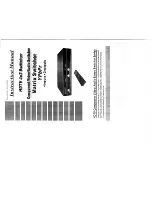
3
2.
The device automatically sets the port to the forwarding state after the detection timer set by
using the
shutdown-interval
command expires. For more information about the
shutdown-interval
command, see
Fundamentals Command Reference
.
3.
The device shuts down the port again if a loop is still detected on the port when the detection
timer expires.
This process is repeated until the loop is removed.
NOTE:
Incorrect recovery can occur when loop detection frames are discarded to reduce the load. To avoid
this, use the shutdown action, or manually remove the loop.
Loop detection tasks at a glance
To configure loop detection, perform the following tasks:
1.
{
Enabling loop detection globally
{
Enabling loop detection on a port
2.
(Optional)
Setting the loop protection action
{
Setting the global loop protection action
{
Setting the loop protection action on an interface
3.
(Optional)
Setting the loop detection interval
Enabling loop detection
Restrictions and guidelines for loop detection configuration
You can enable loop detection globally or on a per-port basis. When a port receives a detection
frame in any VLAN, the loop protection action is triggered on that port, regardless of whether loop
detection is enabled on it.
Enabling loop detection globally
1.
Enter system view.
system-view
2.
Globally enable loop detection.
loopback-detection global enable vlan
{
vlan-id--list
|
all
}
By default, loop detection is globally disabled.
Enabling loop detection on a port
1.
Enter system view.
system-view
2.
Enter Layer 2 Ethernet interface view or Layer 2 aggregate interface view.
interface
interface-type interface-number
3.
Enable loop detection on the port.
loopback-detection enable vlan
{
vlan-id--list
|
all
}
Summary of Contents for S6850 Series
Page 108: ...48 WGE1 0 3 32768 49153 50100 0x7b 0001 0001 0001 ACDEF...
Page 259: ...21 6 N A 200 6...
Page 337: ...ii...
















































